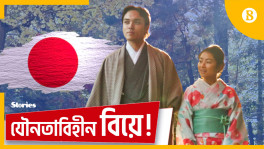The system in which we live is not built to sustain people who are into arts: Nadeem Zaman
Author of “In the Time of the Others”, Nadeem Zaman spoke the importance of reading everything and the inherent biases of the publishing industry

Nadeem Zaman is a Bangladeshi-American author. His debut novel "In the Time of the Others", an account of the Liberation War in 1971, was longlisted for the DSC Prize for South Asian Literature 2019. The University of Illinois alum is currently a visiting Instructor of English at St. Mary's College of Maryland.
In an interview with The Business Standard, he talked about why he writes and how new writers can work to become better writers.
TBS: For native Bangla speakers, are there limitations in becoming an English author? Can you be as expressive in English as you can be in Bangla?
Nadeem Zaman (NZ): I started writing in English from a young age, I went to an English medium school and read a lot in English. And now I write in English. If there are limitations, they are ones that any individual may have. I do not think there are any concrete limitations. If a person learns English literature and is able to read in English, he can very well craft in English.
Of course, being a Bangladeshi writer writing in English in the US brings a different challenge. If somebody really wants to engage writing in English, a good grasp of Bangla would make them stronger.
I write in English in ways that I can best express. Translation from Bangla, maybe I can bring the essence over, but it would never be a 100 percent. For example, my favourite poet is Kazi Nazrul Islam, and translating his work to English does not bring the same kind of energy.
I speak in English most of the time, during classes, in my social life etc. When I speak in Bangla, similar feelings come off as different.
TBS: How do you prepare before beginning to write a story? Is there a routine that you follow?
NZ: I have gotten into the habit of writing every day, especially because of my teaching schedule. It is the first thing I do when I wake up, I bring myself to the desk.
After I finished my first novel and it had gone to the press, all the work was done. But I immediately started working on the next novel, which was already in my mind.
Usually I spend two to four hours every day in writing. I work on new ideas all the time.
So, I do not have an unusual writing schedule, I do it all week.

TBS: Why did you become a writer?
NZ: I was eight or nine years old when I wrote a short story called "Tiger Hunt". The story was about hunting down a man-eater tiger. I gave it to my grandfather and he edited it. This is my first memory of writing and loving it.
I was fascinated by all the things that came together to make a story. As Bengalis we love making stories, sometimes we have danger and conflict in them, and pretty much everything that makes an amazing story.
I heard stories about the Liberation War from my relatives, how they would turn off the lights and hide under the bed. There was one incident where my grandmother had to fend off the Pakistani soldiers from her house.
As a young reader, I read a lot of comics, I read The Hardy Boys series and all, and later I read books assigned at school.
When I used to read, the writer in me would say that I want to do this, I want to write these down, and I wanted to create what exactly these writers were writing. It took a while and I kept writing through school and high school.
I got really serious about writing during my undergraduate years.
TBS: What books would you suggest aspiring writers read to become better writers?
NZ: Sitting down and beginning writing would be one of the first things, essay or fiction does not matter.
This is what I tell my students as well – sit down, write down the first line, in the first draft you put in everything and then you edit and polish. This is the best way to learn I believe.
People have other obligations during the day, such as school or work. But even if they sit for five minutes every night and write, that is writing. Getting into a schedule is important.
A big recommendation for young writers would be to read everything, and everything means poetry, short stories, newspapers, journals etc. Reading everything means not limiting yourself.
Read everything in English and Bangla, read one author with good dialogue, read another who puts together things you never saw in another.
I like magic realist authors like Gabriel García Márquez and Salman Rushdie but I do not write it. If the author is asking me to trust them, I would.
Read everything, a writer cannot be a writer if he is not a reader.
TBS: How does a writer deal with uncertainty in their careers, financial insecurities etc?
NZ: Financial insecurity may be there for life, and our environment/life is hostile to arts and creativity, unless the new writers have really encouraging parents etc.
If it were up to me, I would say just be a writer. Unfortunately, the system in which we live is not built to sustain people who are into arts.
But medicine and science are as important as arts. Engineers and doctors are human beings, and for human beings to understand themselves, painting, music, theatre and film are essential.
It is great if someone believes that come hell or high water, I will be a writer, but one has to also understand that money does not come from writing.
But there are writers who are well established.
Anybody, student or young person, I would say to them: write, knowing that you would be a writer, and not rich and famous.
TBS: What are the ways for Bangladeshi writers to reach out to international publishers? How can they get their work published?
NZ: This is something that is still in the works, it is still a huge, frustrating challenge.
We are facing multiple odds, we are facing an industry which is largely white.
People who are in position of power, people who are making investment decisions, are largely white men and women. I am not saying that they do not create good things, but they do not perhaps understand everyone a 100 percent.
I wrote about the Liberation War in 1971 but if five white authors were writing about the Vietnam War, those would have been published just like that, no questions asked.
From Bangladeshi writers, publishers usually want stories on oppression, but what about love? It does not have to be about oppression all the time.
But things are changing and the US is going through huge racial, social, and structural changes. India and Pakistan have also brought about changes and Bangladesh is not far behind, it is moving forward.
To encourage young writers, I would tell them that eventually good stories will find a readership, it is just the makeup and representation of people who speak for us need to change.
If there are any literary agents of Bangladeshi heritage in the US, I would definitely reach out to them because it is important for me.
I find independent presses to be one of the easier avenues to publish. The big houses tend to prioritise the commercial side, the sales and numbers. With small presses, they promote authors who do not have an agent.


 Keep updated, follow The Business Standard's Google news channel
Keep updated, follow The Business Standard's Google news channel
















